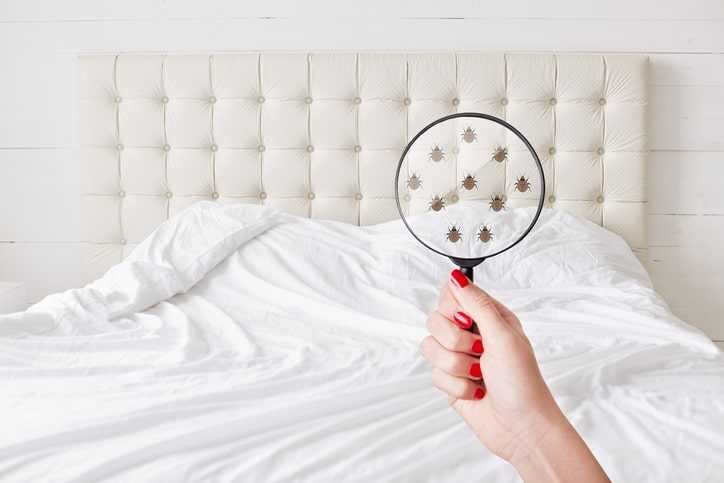Finding bed bugs in your home is a waking nightmare that every renter and homeowner dreads. Even if you only find one or two around your bed it’s almost guaranteed that there are even more creeping around, indicating significant bed bug activity.
When bed bugs strike, it’s crucial to act fast. These blood-sucking pests multiply at an alarming rate, and without the help of pest professionals, stopping them is nearly impossible.
Discover just how quickly bed bugs reproduce with PURCOR Pest Solutions, how bed bug infestations start, and what our certified bed bug control team can do to solve the issue. For immediate assistance with bed bugs, give our team a call.
Understanding Bed Bugs
Bed bugs are small, flat, parasitic insects that feed on the blood of people and animals while they sleep. These pests are reddish-brown in color, wingless, and range from 1mm to 7mm in size, making them difficult to spot. Despite their tiny size, bed bugs can live several months without a blood meal, which makes them particularly resilient. While bed bugs are not known to spread diseases to people, their bites can cause significant irritation, itching, and loss of sleep. The removal of bed bugs from dwellings can be both expensive and inconvenient, often requiring professional intervention.
Where do bed bugs come from?
Before we break down how quickly bed bugs reproduce, it’s crucial to understand how a bed bug problem starts. No matter how clean your home is, any living space is at risk of an infestation, and having one is not a poor reflection on your cleanliness.
Typically, bed bugs move from place to place by getting into clothing, linens, luggage, or furniture. They don’t have wings, so they rely on unsuspecting travelers and thrift shoppers to carry them back to their apartments or houses.
Once bed bugs make it indoors, the trouble starts. They crawl inside walls, and floors, along ceiling openings, and through pipes during the day, and emerge at night to take a bite out of you and your loved ones.
Causes and Spread of Bed Bugs
Bed bugs are experts at hiding and can fit into very small spaces, making them adept at spreading undetected. They can go long periods without a blood meal, which allows them to survive in various environments. Bed bugs spread by getting into the seams and folds of luggage, overnight bags, folded clothes, bedding, furniture, and any other place they can hide. They can also be introduced to a new location through infested items, such as house guests or kids bringing them back in their backpacks. Bed bugs need blood meals to survive and breed, and they can move to a neighboring location if their areas are disturbed, making it easy for them to spread bed bugs from one place to another.
How long does it take bed bugs to hatch?
Bed bugs don’t have to wait for their young to develop before laying an egg, so they can start laying eggs shortly after mating. After they’re laid, bed bug eggs hatch in about six to eight days and mature into adult bed bugs. When multiple bed bugs feed on a host, it can result in visible bite patterns, particularly in areas where skin meets flat surfaces.
Female bed bugs can lay anywhere between five and eight eggs per week, for up to 18 weeks. About six to eight weeks after females lay their eggs, they’ll need to mate again. As a result, the female bed bug continuously lays eggs, inevitably creating a large infestation. To make matters worse, a single female bed bug can produce 200 – 250 eggs in her short lifetime.
The Life Cycle of Bed Bugs
Bed bugs start their life cycle as eggs, about the size of a grain of rice. The eggs eventually hatch into a nymph, which goes through five stages until they reach adult stage. Through each life cycle, bed bugs shed. Bed bugs have a preference for human blood, utilizing their specialized mouthparts to feed while their hosts are asleep. Once the bed bug becomes an adult, it begins to mate. The lifespan of a bed bug is around 6 to 12 months.

Are bed bugs dangerous?
Unlike other pests that carry diseases, such as cockroaches, bed bugs bite people and animals during the night while they sleep, making them more of a nuisance pest than a genuine danger to humans. Their bites may become red and itchy welts, but the bed bugs themselves do not carry diseases or harmful bacteria. The most common issues associated with bed bugs are allergic reactions or psychological stress, such as insomnia or anxiety.
Don’t lose sleep over bed bugs; request a free bed bug control quote from PURCOR.
How do I know if I have bed bugs?
If you have a bed bug infestation, you may notice red bite marks on your skin and rust-colored stains, shed skins, or eggs around your bed or under your mattress. You should also keep an eye out for bed bugs themselves. Knowing where to find bed bugs is crucial for effective control. Bed bugs have red-brown, flat, oval-shaped bodies, and are between 4 and 7 millimeters in diameter. They often resemble apple seeds.
Due to their small size, however, identifying bed bugs on your own can be tricky. If you suspect bed bugs have invaded your space, contact PURCOR. Our experienced pest professionals have the tools and knowledge needed to confirm the pest that’s pestering you.
How to Prevent a Bed Bug Infestation
While completely preventing a bed bug infestation is difficult without pest control, you can take several precautions to prevent bed bugs, such as:
- Checking second-hand furniture for bed bugs before bringing it inside your home
- Use mattress protectors to keep bed bugs off
- Vacuum often to suck up potential bed bug eggs or live bed bugs in your home
- When traveling, check your hotel mattress for bed bugs before lying down
- Avoid setting luggage on the hotel bed or floor
- Clean and isolate your luggage after traveling
Treating Bed Bug Bites
Bed bug bites can cause inflammatory reactions in some people, but they usually do not require medical treatment. The best way to treat a bite is to apply antiseptic creams or lotions to help with itching and to avoid scratching the area to prevent secondary infections. For those experiencing itchy inflammatory reactions, an antihistamine may help control the itching. If you think you are having an allergic reaction to bed bug bites, it is important to speak with your healthcare provider for appropriate advice and treatment.
Professional Treatment Options for Bed Bug Infestations
If you suspect a bed bug infestation, it is crucial to contact a professional pest control company experienced in treating bed bugs. These professionals typically use insecticides to treat the affected area. However, a comprehensive approach is often required to eliminate bed bugs effectively. An integrated pest management (IPM) approach combines techniques that pose the lowest risk to human health and the environment. Strategies for controlling bed bugs include using non-chemical methods, sealing cracks and crevices, washing and drying bedding, using mattress encasements, vacuuming and steaming, and applying diatomaceous earth. Pesticides may not always be effective against bed bugs and can be dangerous if used improperly, so they should be used with caution and under the guidance of a professional.
Solve Your Bed Bug Infestation with PURCOR
While you can use several preventative measures to minimize your chances of a bed bug infestation, bed bugs are one of the trickiest pest species to handle.
At PURCOR Pest Solutions, we provide effective, long-lasting bed bug treatments to remove bed bugs from your home and keep them out. With our sustainable, environmentally conscious solutions, your home will be safeguarded against bed bugs year-round with quarterly visits. Contact PURCOR today for a free quote or to schedule a service appointment.
"*" indicates required fields
"*" indicates required fields




